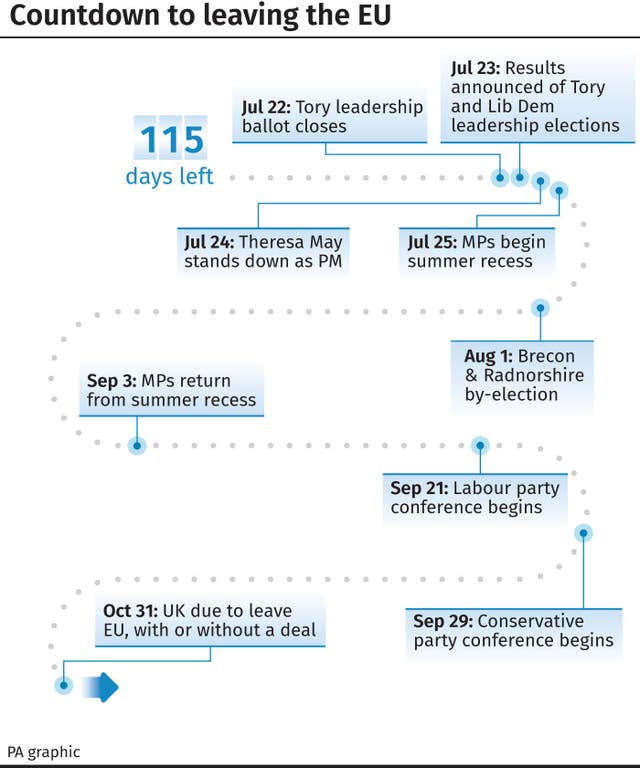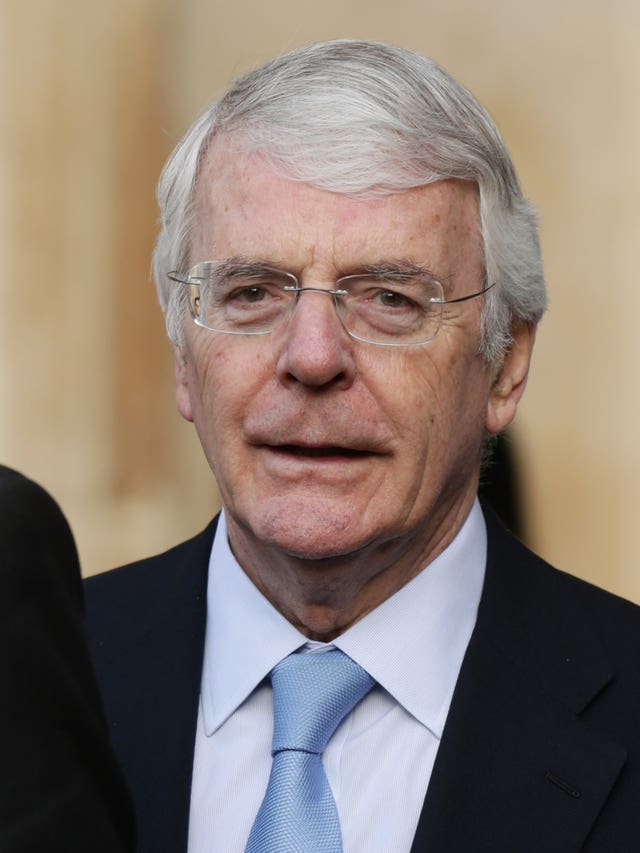Chancellor Philip Hammond has said he does not expect to serve in the Cabinet if Boris Johnson becomes Prime Minister as he signalled he will be a “nightmare” to the front runner in the Tory leadership race over a no-deal Brexit.
Mr Hammond insisted he would use the Commons backbenches to “vigorously” battle any attempt at withdrawing from the EU without a deal.
Asked if he would jump before he was pushed if Mr Johnson takes the Tory crown in two weeks’ time, Mr Hammond told ITV’s Peston: “My expectation is that I will not be serving in the next administration.

“But, I want to say this because I read some stuff in the papers earlier this week about how I would be a nightmare on the backbenches.
“I will continue to argue vigorously against a no-deal Brexit.
“And I will certainly do everything I can to prevent a no-deal Brexit without parliamentary approval.”
The pointed comments came after Mr Johnson was put on notice to expect a legal battle with former prime minister Sir John Major if he tries to suspend Parliament in order to force through a no-deal Brexit.
Former Conservative leader Sir John said it would be “utterly and totally unacceptable” for any British premier to shut down Parliament, and he would seek a judicial review if it happened.
Mr Johnson dismissed Sir John’s “very odd” threat of being dragged through the courts, insisting that Parliament should accept its responsibility to deliver Brexit.
Former British PM Sir John Major will “seek a judicial review” to prevent the next prime minister suspending Parliament to force through a no-deal Brexit #r4today https://t.co/MyWlMEV8nK pic.twitter.com/0aLl8Ej5H5
— BBC Radio 4 Today (@BBCr4today) July 10, 2019
But he has refused to rule out proroguing Parliament to prevent MPs blocking a no-deal exit from the European Union on October 31.
The Tory leadership campaign frontrunner said: “What we are going to do is deliver Brexit on October 31, which is what I think the people of this country want us to get on and do.
“I think everybody is fed up with delay and I think the idea of now consecrating this decision to the judiciary is really very, very odd indeed.
“What we want is for Parliament to take their responsibilities, get it done as they promised that they would.
“They asked the British people whether they wanted to leave in 2016, the British people returned a very clear verdict, so let’s get it done.”

In order to prorogue Parliament, shutting it down until the next state opening, a prime minister would have to ask the Queen to formally allow it.
Although the Queen’s decision could not be challenged, Sir John said the advice of the prime minister could be.
The monarch would be “in the midst of a constitutional controversy that no serious politician should put the Queen in the middle of”, Sir John said.
“I for one would be prepared to go and seek judicial review to prevent Parliament being bypassed,” he told BBC Radio 4’s Today.
The potential suspension of Parliament was one of the issues on which Mr Johnson and his rival Jeremy Hunt clashed in a televised showdown on Tuesday night.
Mr Hunt issued a stark warning about the prospect of suspending Parliament.
“When that has happened in the past, when Parliament has been shut down against its will, we actually had a civil war,” Mr Hunt said.
Sir John, who is backing Mr Hunt for the Tory leadership, said: “There is no conceivable justification, wherever we are, in closing down Parliament to bypass its sovereignty.
“I seem to recall that the Brexiteers, led by Mr Johnson, actually campaigned in the referendum for the sovereignty of Parliament… They can’t be concerned for the sovereignty of Parliament except when it is inconvenient to Mr Johnson.”
He was challenged over the timing of his decision to close down Parliament ahead of the 1997 general election, which prevented a report on the cash for questions scandal being considered by MPs.
Sir John said “we carried the election until almost the very last date” and it was an “absurd charge”.
The former premier, who campaigned to remain in the EU, warned the incoming prime minister not to stick rigidly to the “artificial date” for Brexit of October 31.
He warned there could be a “great deal of chaos” if businesses were not ready for a Halloween exit.
Mr Johnson has made a “do or die” commitment to that date, while Mr Hunt has also set it as his goal.
“This date of October 31 has a great deal more to do with the election for leader of the Conservative Party than it has with the interests of the country, and that is the wrong way round,” Sir John said.
“National leaders look first at the interests of the country, not first at the interests of themselves and appealing to a particular part of a small electorate for a particular post, however important that post may be.”

